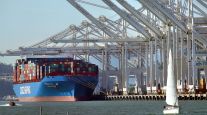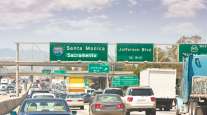California Aims to Close Drayage Loopholes to Prevent Transfer of Freight to Older Trucks
This story appears in the Nov. 8 print edition of Transport Topics.
California environmental regulators plan to plug a pair of loopholes in the state’s drayage regulation that allow some operators to game the system, port officials and state regulators said.
The changes would give state inspectors and port police officers authority to issue citations to drayage operators who enter and exit the ports with clean trucks but transfer their cargo to older trucks with engines that don’t comply with current emissions regulations just outside port gates to carry the freight to customers.
After the transfer, the original compliant trucks — known in the industry as “frequent fliers” — quickly return to pick up another load and repeat the transfer process.
California Air Resources Board and port officials said they have observed and received complaints about the cargo switches, or “dray-offs,” but so far have been mostly powerless to ticket truckers violating the “spirit” of the state and ports’ diesel emissions-reduction programs.
“Drayage operators tell us that they’ve spent money to buy new trucks and they think that the people who are doing this are gaming the system, and they don’t like it,” Christopher Cannon, the director of environmental management for the Port of Los Angeles, told Transport Topics. “It violates the spirit of our program, which is designed to encourage the use of new trucks for drayage.”
Robert Curry Jr., president of California Cartage Co., Long Beach, Calif., said he sometimes sees older trucks on the freeways leading out of the Southern California ports.
“So obviously, he didn’t pick that container up at the harbor because his truck doesn’t fall into the category of a new clean diesel truck,” Curry told TT. “But the numbers, I don’t know.”
Another loophole that some drayage operators reportedly have taken advantage of is the use of emissions-noncompliant Class 7 trucks to pick up loads at ports. The loophole exists, officials said, because their clean trucks programs were written with the assumption that only Class 8 trucks would service the ports.
Because Class 7 trucks are exempt from port emissions-reduction programs, they cannot be banned from entering the port, no matter how old they are, CARB officials said.
At the Port of Los Angeles, for example, about 500 Class 7 trucks have been making frequent visits, Cannon said.
The CARB amendments would “level the playing field” for drayage operators by making it against state regulations to do a dray-off or to enter a port with a Class 7 truck unless it was emissions-compliant.
The change would mitigate dray-off activities by expanding the definition of a drayage truck to include “trucks hauling cargos, containers or chassis that are either bound from or destined for a port or intermodal rail yard,” a CARB staff report said.
If there was a cargo transfer anywhere along the route from the port to a warehouse, the load would have to be handed over to a port emissions-compliant truck, said Mike Sutherland, manager of CARB project support.
If the amendment is approved, dray-off violators could be fined $1,000 for the first offense and $1,800 for a second offense, Paul Jacobs, chief of CARB’s mobile source enforcement branch, told Transport Topics.
While dray-offs are occurring statewide, they seem more frequent at the ports of Oakland, Los Angeles and Long Beach, where trucking volume is higher and there are more convenient spots for cargo transfers, Jacobs said.
Art Wong, a Port of Long Beach spokesman, said port officials have been aware of the problem for the past year.
Although they have no statistics, port officials do not believe the problem is widespread, Wong said.
“Our tracking doesn’t show many trucks that do more than the routine three or four trips a day,” Wong said. Trucks that make more than four trips to a port are suspected to be “frequent fliers.”
“We were planning a port tariff to stop this practice, but are holding off until we see what CARB does,” Wong said.
Los Angeles port police have been looking for violators, but can’t always ticket them unless the container swaps occur on terminal property. Local police and CARB inspectors also can write tickets currently for related offenses if the swaps violate a local ordinance such as illegal idling, according to Cannon.
Matthew Schrap, director of environmental affairs for the California Trucking Association, said that port and CARB officials are relying heavily on tips from compliant truckers, who are forced to dial the “666 diesel number and rat out our neighbor’s kid.”
“CARB has very few people who enforce these regulations,” Schrap told TT. “It’s turning into a stool-pigeon culture here that he who turns in his neighbor first, wins. The problem is it’s putting it back on us, not only to comply with the regulations, but to also enforce them.”
CARB is scheduled to take up the amendments in mid-December.




